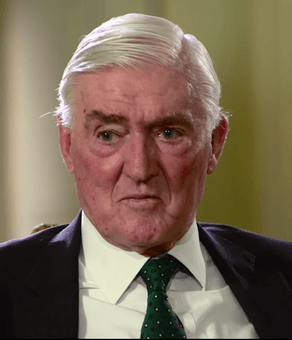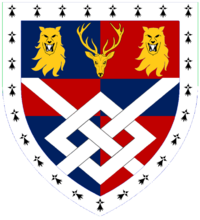Cecil Parkinson facts for kids
Quick facts for kids
The Lord Parkinson
|
|
|---|---|

Parkinson during an interview at 10 Downing Street, a week after his retirement from the House of Lords
|
|
| Chairman of the Conservative Party | |
| In office 11 June 1997 – 1 June 1998 |
|
| Leader | William Hague |
| Preceded by | Brian Mawhinney |
| Succeeded by | Michael Ancram |
| In office 14 September 1981 – 11 June 1983 |
|
| Leader | Margaret Thatcher |
| Preceded by | The Lord Thorneycroft |
| Succeeded by | John Gummer |
| Secretary of State for Transport | |
| In office 24 July 1989 – 28 November 1990 |
|
| Prime Minister | Margaret Thatcher |
| Preceded by | Paul Channon |
| Succeeded by | Malcolm Rifkind |
| Secretary of State for Energy | |
| In office 13 June 1987 – 24 July 1989 |
|
| Prime Minister | Margaret Thatcher |
| Preceded by | Peter Walker |
| Succeeded by | John Wakeham |
| Secretary of State for Trade and Industry | |
| In office 12 June 1983 – 14 October 1983 |
|
| Prime Minister | Margaret Thatcher |
| Preceded by |
|
| Succeeded by | Norman Tebbit |
| Chancellor of the Duchy of Lancaster | |
| In office 6 April 1982 – 11 June 1983 |
|
| Prime Minister | Margaret Thatcher |
| Preceded by | The Baroness Young |
| Succeeded by | The Lord Cockfield |
| Paymaster General | |
| In office 14 September 1981 – 11 June 1983 |
|
| Prime Minister | Margaret Thatcher |
| Preceded by | Francis Pym |
| Succeeded by | John Gummer |
| Minister of State for Trade | |
| In office 7 May 1979 – 14 September 1981 |
|
| Prime Minister | Margaret Thatcher |
| Preceded by | Michael Meacher |
| Succeeded by | Peter Rees |
| Member of the House of Lords Lord Temporal |
|
| In office 29 June 1992 – 14 September 2015 Life Peerage |
|
| Member of Parliament for Hertsmere South Hertfordshire (1974-1983) Enfield West (1970-1974) |
|
| In office 20 November 1970 – 16 March 1992 |
|
| Preceded by | Iain Macleod |
| Succeeded by | James Clappison |
| Personal details | |
| Born | 1 September 1931 Carnforth, Lancashire, England |
| Died | 22 January 2016 (aged 84) Marylebone, London, England |
| Political party | Conservative |
| Spouse |
Anne Jarvis
(m. 1957) |
| Children | 4 |
| Alma mater | Emmanuel College, Cambridge |
Cecil Edward Parkinson, Baron Parkinson (1 September 1931 – 22 January 2016) was an important British politician. He was a member of the Conservative Party and served as a minister in the government.
Before becoming a politician, he trained as an chartered accountant (someone who manages money for businesses). He became a Member of Parliament in 1970. In 1979, he was made a minister in Margaret Thatcher's first government. He played a key role in the Conservative Party's successful election campaign in 1983. After this, he became the Secretary of State for Trade and Industry.
Later, Parkinson served as Secretary of State for Energy and then Secretary of State for Transport. He left his government role in 1990, the same day Margaret Thatcher resigned as Prime Minister. In 1992, he was given the title Baron Parkinson, which meant he became a member of the House of Lords. He retired from the House of Lords in 2015.
Contents
Early Life and Education
Cecil Parkinson was born in Carnforth, Lancashire, England, on September 1, 1931. His father, Sydney Parkinson, worked in a warehouse and later for the railway. His mother, Bridget, came from a family with roots in Scotland and Northern Ireland.
He went to Lancaster Royal Grammar School from 1943 to 1950. He earned a scholarship to Cambridge University, where he first studied English and then law at Emmanuel College. While at university, he was a talented athlete and won a "Blue" for competing in running races.
Interestingly, when he was at university, Parkinson supported the Labour Party and was even a member for a short time. He helped them campaign in the 1950 and 1951 general elections. After university, he served in the Royal Air Force for two years.
Before entering politics, Parkinson worked as a manager for a company called Metal Box. He also became a qualified chartered accountant and started his own business, Parkinson-Hart Securities, in 1961.
Becoming a Member of Parliament
Cecil Parkinson first tried to become a Member of Parliament (MP) in the 1970 general election for Northampton, but he didn't win. However, he was elected as an MP for Enfield West in a special election in November 1970.
When his constituency changed, he was elected for the new South Hertfordshire area in 1974. After the 1979 general election, he became a junior minister for trade.
In 1981, he was given more important roles. He became the Chairman of the Conservative Party and also the Paymaster General, which meant he had a seat in the government's top team, the Cabinet. In 1982, he also became the Chancellor of the Duchy of Lancaster. Even though he was relatively new to these high-level roles, he was part of a small group called the War Cabinet that Margaret Thatcher set up during the Falklands War.
Working in Government
Parkinson played a very important part in the Conservative Party's election campaign in 1983. He was elected as the MP for the new Hertsmere area. Because of his success, Margaret Thatcher wanted to give him a very senior job as Foreign Secretary. However, he told her that this might not be a good idea. Instead, he was appointed Secretary of State for Trade and Industry.
He later resigned from this role in October 1983.
After some time away from the main government roles, he returned in 1987 as Secretary of State for Energy. In 1989, he became Secretary of State for Transport. One of his big achievements in this role was announcing plans for new main railway tunnels across London, a project known as Crossrail. He resigned from his position in 1990, at the same time that Margaret Thatcher stepped down as Prime Minister. He then left the House of Commons in the 1992 general election.
After the 1992 election, he was given the title Baron Parkinson, which meant he became a member of the House of Lords for life.
Later Political Roles
Parkinson returned to a main political role in 1997 when William Hague made him the Chairman of the Conservative Party again. He left this job in 1998. After that, he mostly stayed out of the public eye, but he was still involved with some political groups, like being a vice-chairman of the Conservative Way Forward group and honorary president of Conservative Friends of Poland.
Personal Life
Cecil Parkinson married Ann Mary Jarvis on February 2, 1957. They had three daughters: Mary, Emma, and Joanna.
He was a big fan of the football team Preston North End. He was also an active freemason.
Death
Cecil Parkinson passed away from colorectal cancer in London on January 22, 2016. His daughter, Mary, sadly died in December 2017 at the age of 57.
Charitable Work
Parkinson was one of the three Presidents of a charity in the UK called Action on Addiction, which helps people dealing with addiction.
In the Media
Parkinson was sometimes featured in the satirical magazine Private Eye and the TV show Spitting Image. He was also interviewed for a 2006 BBC TV show called Tory! Tory! Tory!, where he talked about the rise of Thatcherism.
Arms
|
 | Bayard Rustin |
 | Jeannette Carter |
 | Jeremiah A. Brown |



